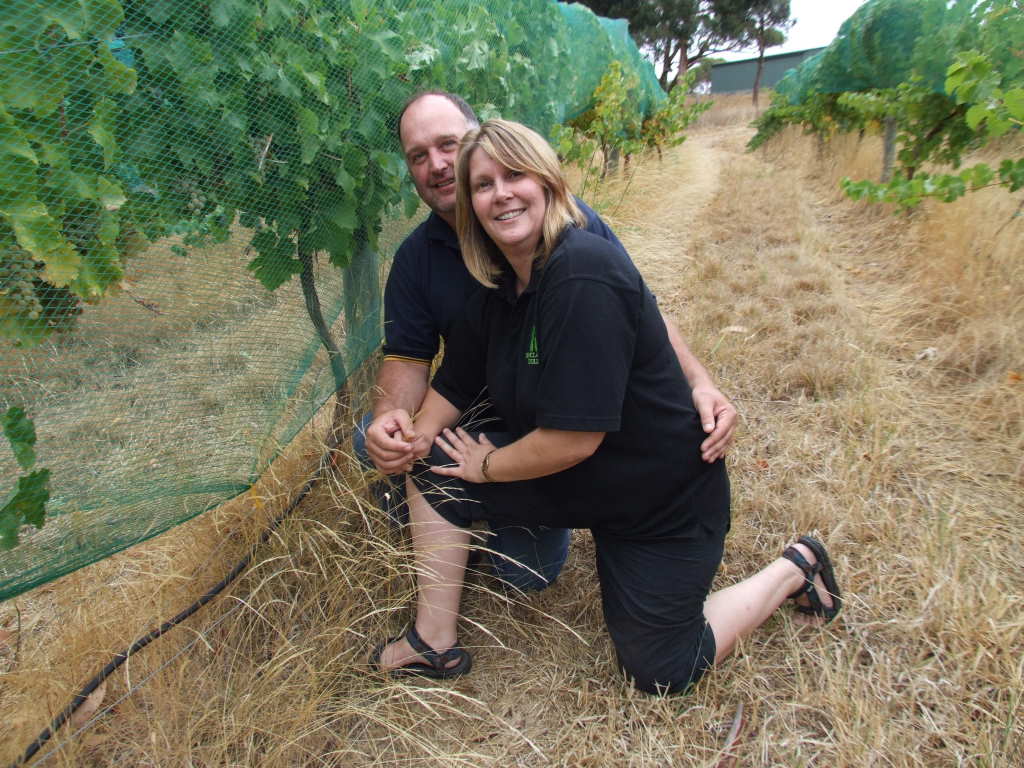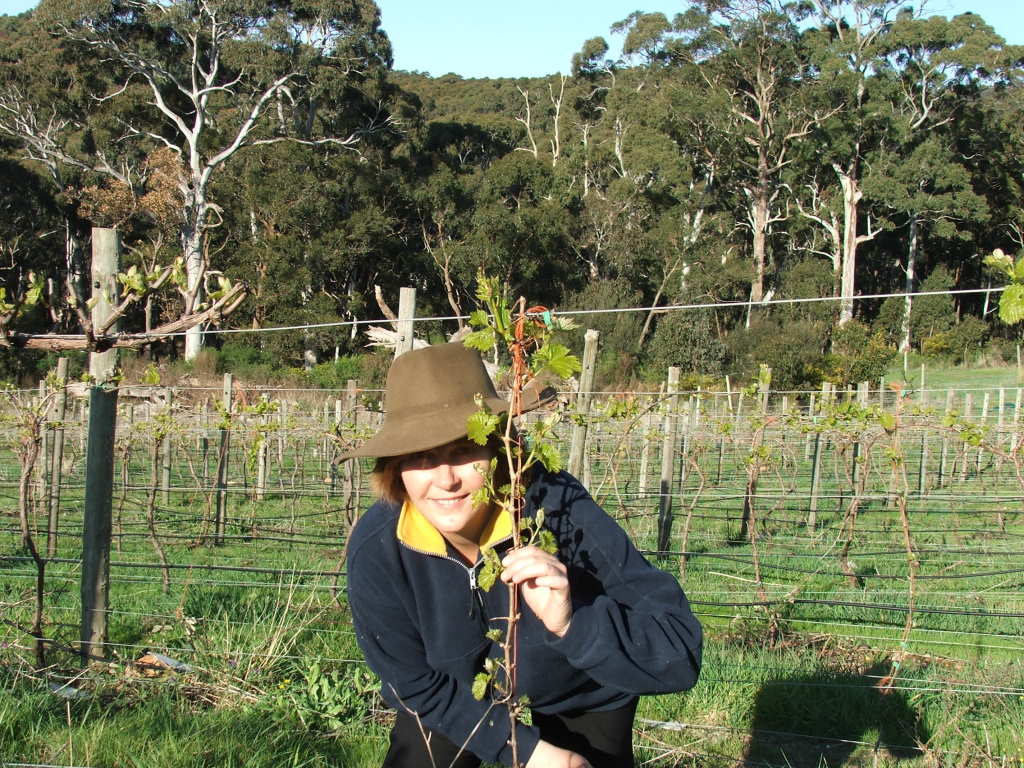Nestled high in Norton Summit in one of the most picturesque parts of the Adelaide Hills.
At an elevation of 485 metres, this site was selected with its gentle northerly slope to maximise the sunlight on the vines.
Passionate about our wine, the Delaneys’ believe the secret to producing a great wine starts in their Adelaide Hills vineyard. We have a strong focus on soil health, using a combination of biodynamic methods and native grasses in our vineyard to encourage beneficial insects, ensuring the vineyard remains in balance with nature. The wines produced display great fruit expression and cleanliness, reflecting the unique site-specific characteristics.
Chardonnay (clone I10V1) and Sauvignon Blanc (clone F4V6) varieties were chosen based on their suitability to the cooler climate of the Adelaide Hills and the elevation of our vineyard. Approximately one thousand of each variety were planted with a row spacing of 1.25 by 2.2 metres. The vine rows run north-south to allow equal sunlight on both sides of the vines, ensuring even ripening of the grapes.
At an elevation of 485 metres, this site was selected with its gentle northerly slope to maximise the sunlight on the vines.
Passionate about our wine, the Delaneys’ believe the secret to producing a great wine starts in the vineyard. We have a strong focus on soil health, using a combination of biodynamic methods and native grasses in our vineyard to encourage beneficial insects, ensuring the vineyard remains in balance with nature. The wines produced display great fruit expression and cleanliness, reflecting the unique site-specific characteristics.
Chardonnay (clone I10V1) and Sauvignon Blanc (clone F4V6) varieties were chosen based on their suitability to the cooler climate of the Adelaide Hills and the elevation of our vineyard. Approximately one thousand of each variety were planted with a row spacing of 1.25 by 2.2 metres. The vine rows run north-south to allow equal sunlight on both sides of the vines, ensuring even ripening of the grapes.

At an elevation of 485 metres, this site was selected with its gentle northerly slope to maximise the sunlight on the vines.
Passionate about our wine, the Delaneys’ believe the secret to producing a great wine starts in the vineyard. We have a strong focus on soil health, using a combination of biodynamic methods and native grasses in our vineyard to encourage beneficial insects, ensuring the vineyard remains in balance with nature. The wines produced display great fruit expression and cleanliness, reflecting the unique site-specific characteristics.
Chardonnay (clone I10V1) and Sauvignon Blanc (clone F4V6) varieties were chosen based on their suitability to the cooler climate of the Adelaide Hills and the elevation of our vineyard. Approximately one thousand of each variety were planted with a row spacing of 1.25 by 2.2 metres. The vine rows run north-south to allow equal sunlight on both sides of the vines, ensuring even ripening of the grapes.

Our philosophy in the vineyard is to use sustainable viticulture practices to ensure the vineyard remains in balance with nature. This, in conjunction with the use of minimal sprays, is consistent with our approach towards organic practice.
Our vines are tended by hand using traditional methods. Each vine is individually cane pruned over winter and the grapes are harvested by hand at optimum maturity in late summer to early autumn.
We use modern canopy management techniques – a modified smart dyson system. This increases the total canopy area by splitting and opening up the canopy, maximising the amount of sunlight penetrating the vine. This has many benefits such as reducing fungal disease due to increased airflow (requiring less spraying), assisting with ripening of fruit and increasing fruit quality.
We are committed to producing Adelaide Hills wine of the highest quality and believe that the secret to making a great wine starts in the vineyard, by producing grapes of the highest quality using well managed ecologically sustainable practices.

Our philosophy in the vineyard is to use sustainable viticulture practices to ensure the vineyard remains in balance with nature. This, in conjunction with the use of minimal sprays, is consistent with our approach towards organic practice.
Our vines are tended by hand using traditional methods. Each vine is individually cane pruned over winter and the grapes are harvested by hand at optimum maturity in late summer to early autumn.
We use modern canopy management techniques – a modified smart dyson system. This increases the total canopy area by splitting and opening up the canopy, maximising the amount of sunlight penetrating the vine. This has many benefits such as reducing fungal disease due to increased airflow (requiring less spraying), assisting with ripening of fruit and increasing fruit quality.
We are committed to producing Adelaide Hills wine of the highest quality and believe that the secret to making a great wine starts in the vineyard, by producing grapes of the highest quality using well managed ecologically sustainable practices.

Our philosophy in the vineyard is to use sustainable viticulture practices to ensure the vineyard remains in balance with nature. This, in conjunction with the use of minimal sprays, is consistent with our approach towards organic practice.
Our vines are tended by hand using traditional methods. Each vine is individually cane pruned over winter and the grapes are harvested by hand at optimum maturity in late summer to early autumn.
We use modern canopy management techniques – a modified smart dyson system. This increases the total canopy area by splitting and opening up the canopy, maximising the amount of sunlight penetrating the vine. This has many benefits such as reducing fungal disease due to increased airflow (requiring less spraying), assisting with ripening of fruit and increasing fruit quality.
We are committed to producing Adelaide Hills wine of the highest quality and believe that the secret to making a great wine starts in the vineyard, by producing grapes of the highest quality using well managed ecologically sustainable practices.